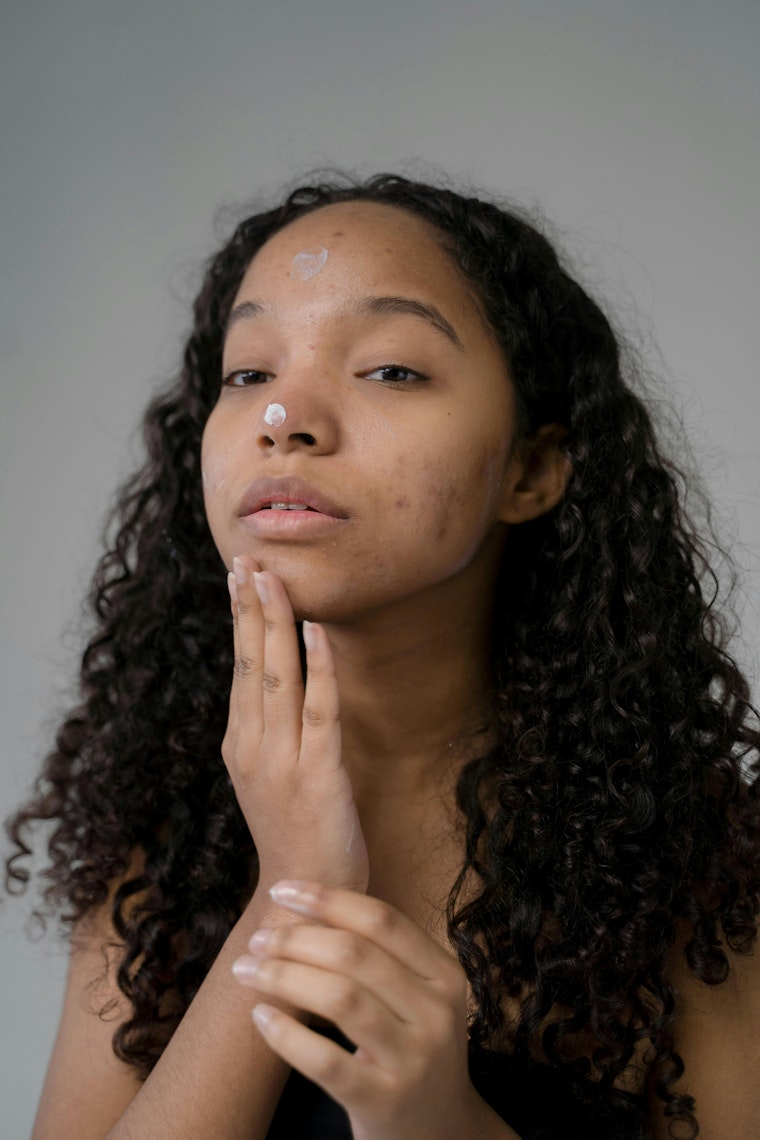Helping your daughter manage acne
Practical ways to support your teen

Updated September 10, 2025 • Medically reviewed by Dr. Katie Knight
Medically reviewed by Dr. Katie KnightIn this article
Quick summary
- Acne is very common in teens, but it can feel overwhelming for them and cause them to struggle with self esteem
- Gentle skincare routines and realistic expectations go a long way
- Emotional support is just as important as physical treatment, and you can always gift them luna which helps build confidence in their skin and offers teen-focused advice to help with spots, too

It can be really hard to see your daughter struggling with acne.
Most teens go through breakouts at some point, and while it’s often temporary, it can feel huge to them in the moment.
Acne isn’t just about skin – it can affect mood, self-esteem, and even social confidence.
In a poll by luna of nearly 2000 teens, nearly half (47%) say it affects their social activities at one point or another.
As a parent, small ways of showing you care can go a long way.
From practical solutions to emotional support, there are things you can do to help your daughter with acne and allow them to feel more confident and comfortable.
Why does your daughter have acne?
Acne is usually caused by hormonal changes in puberty.
But certain products, such as makeup and cosmetics, and medications, can also play a part in acne.
Genetics is also a factor. So if you had acne as a teen, it is more likely that your teen will have it, too.
The good news? With the right care, most teens see improvement over time.
How do you help your daughter's acne?
Here are some ways you can support your daughter in treating acne:
- Encourage gentle skincare that's suitable for teens: help them choose a mild cleanser and an oil-free moisturiser + SPF
- Explore over-the-counter options: products with ingredients like benzoyl peroxide or salicylic acid can help mild cases
- Promote healthy habits: consistent sleep, balanced meals, and stress management can support skin health (and overall wellbeing)
- Talk about acne habits: picking, squeezing, and popping acne can cause infections and scars
Supporting them emotionally
Sometimes acne feels worse on the inside than how it looks on the outside. It might look “mild” to you, but could still be causing your teen a lot of anguish.
Your daughter might compare themselves to friends or influencers online, and it’s easy for them to feel discouraged.
You can:
- Listen when they want to vent, without jumping straight to solutions
- Remind them that acne is normal and temporary, and that their worth isn’t tied to their skin
- Encourage activities that build confidence beyond appearance (sports, hobbies, creative outlets)
- Remind them that acne is not their fault and it’s not about “bad hygiene”
- Know the signs of low self-esteem and what you can do to support them
What is the best treatment for acne in girls?
There’s no one-size-fits-all answer, but common options include:
- Mild acne: gentle cleansing and over-the-counter products with benzoyl peroxide or salicylic acid which can be obtained from a pharmacist
- Moderate acne: prescription creams or oral medications on prescription from a doctor
- Severe acne: stronger treatments such as retinoids, antibiotics, or hormonal options (like birth control pills in some cases)
If acne is leaving scars, painful, or affecting her self-esteem, a doctor is the best next step.
Are there any natural acne treatments?
Some teens are curious about natural remedies, and while they shouldn’t replace proven medical treatments, they can sometimes help.
Options like tea tree oil (in diluted form – always with a carrier oil), aloe vera, or honey face masks may soothe skin.
Just make sure any “DIY” treatments are safe and tested first, as some natural remedies can irritate sensitive skin.
Will your daughter’s acne go away?
In most cases, yes.
Teen acne usually improves with age as hormones stabilise.
For some, it may continue into their 20s or into later adulthood, but the right treatment can make a big difference along the way.
Remind your daughter that acne is temporary and treatable, and that it doesn’t define who they are, but also set expectations that it won’t magically go away at an exact point.
Helping your teen feel confident in their own skin
Acne can be tough, but it doesn’t have to take over your daughter’s life.
By offering gentle guidance, emotional support, and knowing when to reach out for professional care, hopefully you can help them navigate this stage with confidence.
And remember: they are not alone, and neither are you. Apps like luna can provide extra advice and tools to support both teens and parents through challenges like this.

How we created this article:
luna's team of experts comprises GPs, Dermatologists, Safeguarding Leads and Junior Doctors as well as Medical Students with specialised interests in paediatric care, mental health and gynaecology. All articles are created by experts, and reviewed by a member of luna's senior review team.
Sources:
NHS "Acne" | Accessed 05.09.25
https://www.nhs.uk/conditions/acne/Hopkins Medicine "Acne in children" | Accessed 05.09.25
https://www.hopkinsmedicine.org/health/conditions-and-diseases/acne-in-childrenMayo Clinic "Acne treatment" | Accessed 06.09.25
https://www.mayoclinic.org/diseases-conditions/acne/diagnosis-treatment/drc-20368048Cleveland Clinic "Home remedies for acne"
https://health.clevelandclinic.org/home-remedies-for-acneWe'd love to keep in touch!
Sign up to our parent newsletter for emails on the latest teen trends, insights into our luna community and to keep up to date
By signing up, you are agreeing that we can use your email address to market to you. You can unsubscribe from marketing emails at any time by using the link in our emails. For more information, please review our privacy statement.